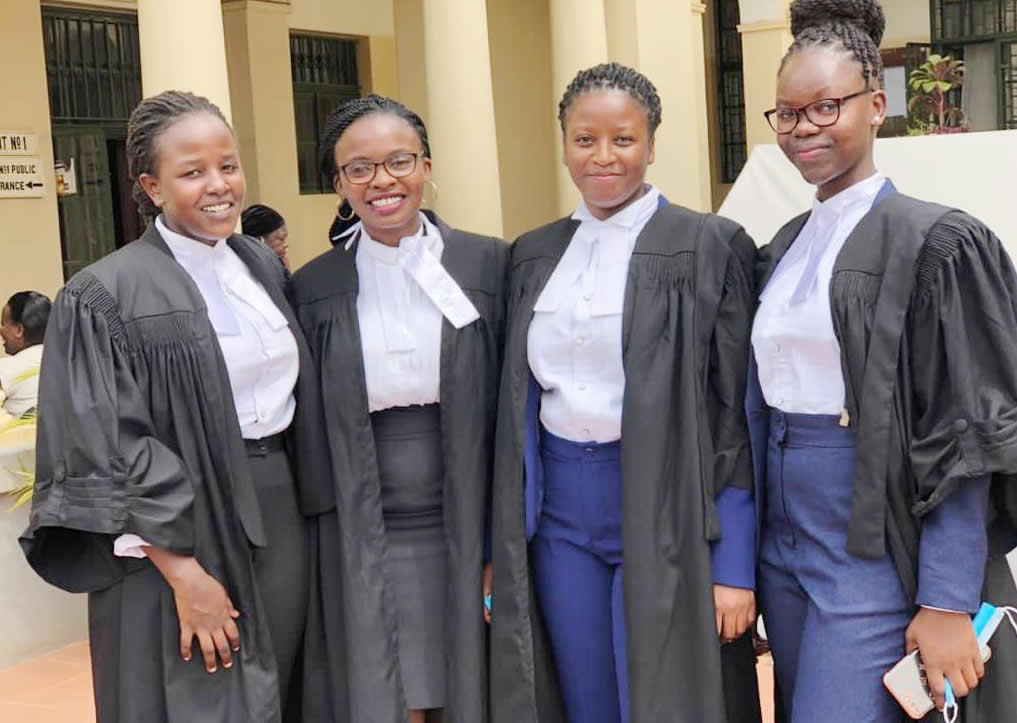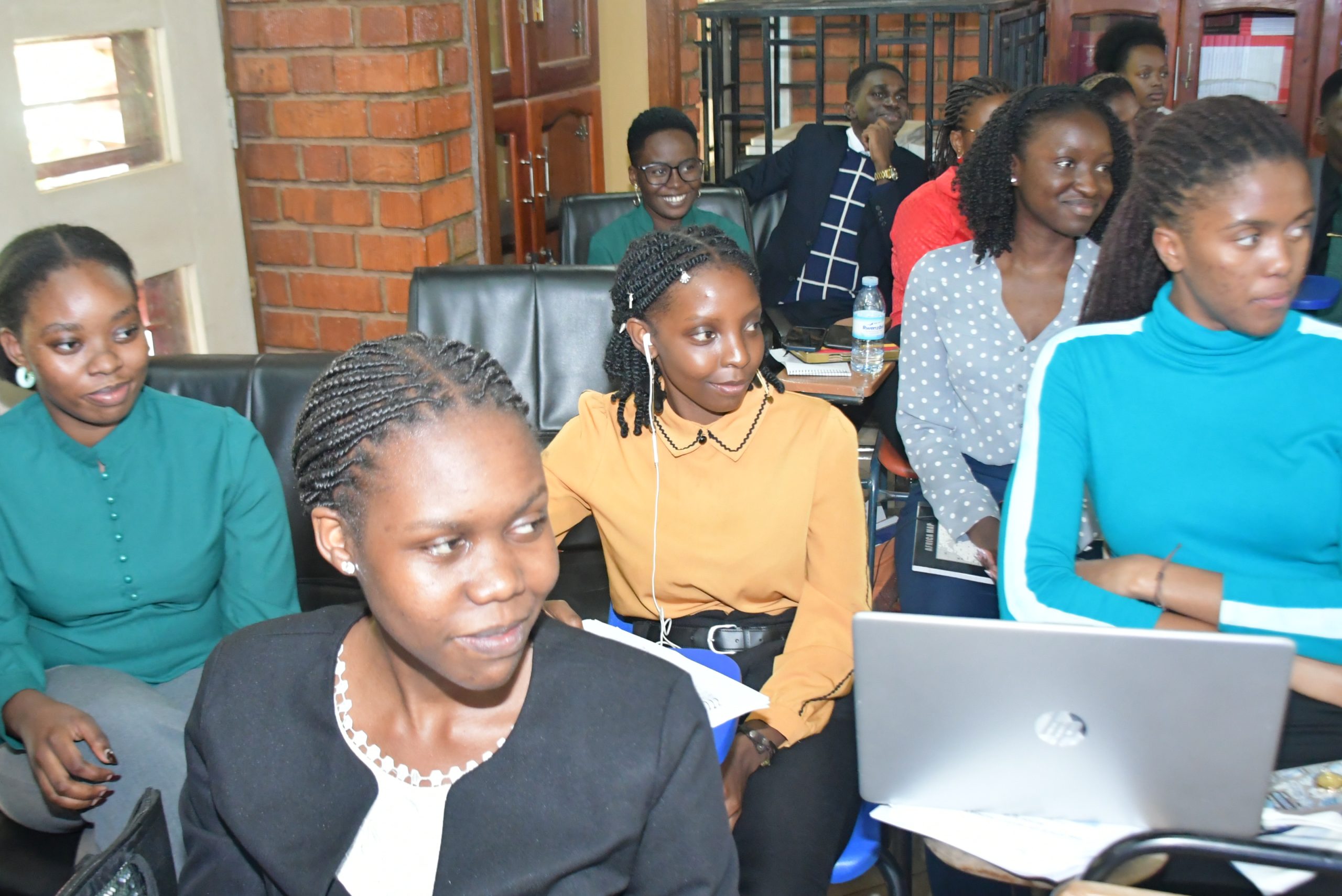Refugee Law Project Training for CLE Class: Students share experiences
The recent training conducted by the Refugee Law Project in Uganda provided us as the Clinical Legal Education (CLE) class with a comprehensive understanding of refugee law and its implications, focusing on both local and global legal frameworks.
The training emphasized the significance of Uganda’s progressive refugee policy, which guarantees protection against discrimination and ensures access to education, healthcare, and employment opportunities for refugees.

The facilitators also highlighted key international agreements, such as the 1951 Refugee Convention and its 1967 Protocol, which establish fundamental principles for protecting the rights of displaced individuals.
The training addressed the crucial issue of mental health challenges among refugees, emphasizing the need for comprehensive support systems. Additionally, we were able to gain insights into the challenges faced by host communities, including resource strain and social tensions. The training emphasized the importance of fostering dialogue, cooperation, and shared responsibility between host communities and refugees to ensure harmonious coexistence and mutual benefit.
Overall, the training equipped us with a deeper understanding of the legal aspects surrounding refugee law in Uganda, reinforcing the commitment to protect and integrate displaced individuals within the country’s borders. In respect to mental health, we gained valuable insights into the mental health challenges experienced by refugees and acquired coping strategies for effectively assisting clients affected by mental health issues. The training highlighted the traumatic experiences endured by refugees, including conflict, persecution, and loss, and emphasized the profound and lasting impacts on their mental well-being. We were educated on the importance of a comprehensive approach to mental health support, including access to counseling, psychosocial services, and community-based interventions. Additionally, we also learned coping strategies to employ when working with clients who have mental health issues. The training underscored the significance of providing a safe and supportive environment, practicing active listening, fostering trust and empathy, and implementing culturally sensitive approaches.

By equipping us with the necessary knowledge and skills, the training aimed to enhance their ability to support and promote the mental well-being of refugees.
Harry Mwesigwa Participating in the Refugee Law Project training organized by the Public Interest Law Clinic at Makerere School of Law was a transformative experience for me. The training provided valuable insights into the refugee legal framework, access to justice for refugees, and the unique challenges faced by refugees in Uganda. It deepened my understanding of the complexities involved in advocating for the rights of refugees and highlighted the importance of addressing mental health and humanitarian considerations.
One of the most impactful aspects of the training was learning about the refugee legal framework. Understanding the 1951 Refugee Convention and its 1967 Protocol provided me with a solid foundation in international refugee law. I gained insights into the legal definition of a refugee, the principle of non-refoulement, and the rights and responsibilities enshrined in the Convention. This knowledge helped me appreciate the significance of providing protection to individuals fleeing persecution and the legal obligations of states in offering asylum.

Access to justice for refugees emerged as a critical theme throughout the training. Exploring the challenges refugees face in navigating legal systems and the importance of providing legal assistance highlighted the need for strong advocacy and support structures. Learning about the various avenues for seeking justice, such as refugee status determination procedures and the role of legal clinics, deepened my commitment to ensuring that refugees have access to fair and effective legal representation.
The training also shed light on the reality of refugee camps in Uganda. Understanding the policies and practices in place to accommodate and support large refugee populations in settlements like Bidi-Bidi, Imvepi, and Rhino Camp was eye-opening. I realized the significance of providing resources and infrastructure for refugees to rebuild their lives and become self-reliant. It emphasized the importance of collaborative efforts among governments, NGOs, and international organizations in providing necessary assistance and creating sustainable solutions.
Furthermore, exploring mental health considerations and humanitarian aspects during the training was a crucial component. Recognizing the psychological impact of trauma on refugees and the need for specialized care and support highlighted the holistic nature of refugee protection. It underscored the importance of addressing mental health alongside legal and humanitarian considerations to ensure the overall well-being and recovery of refugees.

Overall, this training experience was both enlightening and empowering. It deepened my understanding of the legal framework governing refugees, enhanced my awareness of the challenges faced by refugees in Uganda, and reinforced my commitment to advocating for their rights. I am grateful for the opportunity to have participated in this training, and I look forward to applying the knowledge and insights gained to make a positive impact in the lives of refugees.
My name is Susanne Kaguta, a student from the Clinical Legal Education class of 2023, and on 17th May 2023, we were privileged to have a Refugee Law Project Training. Having been told in the earlier weeks about this training, I was excited to attend and learn. One of my expectations from this session was to understand what the Refugee Law Project does.
The team put together an amazing presentation, where I learned about the work of the Refugee Program, which is divided under different thematic programs. The first program was on access to justice for forced migrants where I understood the proper legal framework, the different categories of persons, that is to say, refugees, asylum seekers, expatriates, economic migrants, internally displaced persons, deportees and stateless persons.
We had a video presentation that gave us a view of what refugees go through in their countries of origin and what forces them to cross borders. These stories brought so many emotions as these people leave their homes to save their lives. The work done by all these organizations, as the first points of contact when these people cross borders, portrayed humility. There was a realization that anyone could become a refugee, and this was one of the most important realizations for me. I finally had a glimpse into the state of forced migrants and the humanitarian response of these organizations to assist all the migrants.
The second session was on the program of mental health and psychosocial wellbeing. The team highlighted the mental health challenges that come with forced migrations. The common disorders stated were trauma and PTSD, depression, anxiety, and psychosis. The class was given an opportunity to identify these different disorders and tips on how to handle persons that display the symptoms. I also understood the link between mental health and access to justice.
The co-operation and participation displayed by the class was phenomenal, which could be seen through the excitement every student came in with and the questions asked. The team from the Refugee Law Project ensured to meet the expectations of every student, and I look forward to the next part of the training on the rest of the thematic programs.
I appreciate the team from the Refugee Law Project for sparing the time to equip the class with this information and the PILAC administration for organizing this insightful training.


